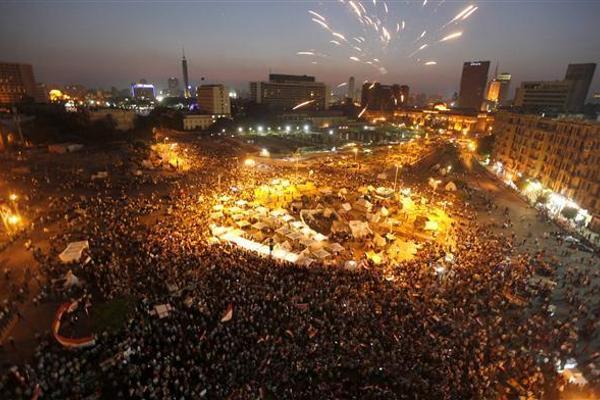Showdown looms as Egypt's Morsi marks first year
CAIRO - Agence France-Presse


Protesters opposing Egyptian President Mohamed Mursi shout solgans and set off fireworks during a protest in Tahrir square in Cairo June 29, 2013. REUTERS/Amr Abdallah Dalsh
Egypt braced for mass protests Sunday with President Mohamed Morsi's opponents determined to oust him and his Islamist supporters vowing to defend his legitimacy to the end, on the anniversary of his turbulent first year in office.The grassroots movement Tamarod -- Arabic for rebellion -- is behind the campaign that claims to have collected millions of signatures for Morsi's departure and new elections.
Posters calling on people to join the protests against his rule have sprung up around Cairo, plastered on walls and stuck on car windows along with "June 30" graffiti daubed along streets.
The week leading up to the showdown has already seen eight people killed, including an American, and scores more injured as protesters from both sides took to the streets.
Morsi, a senior Muslim Brotherhood leader, is Egypt's first president elected in a free vote, catapulted to power by the 2011 Arab Spring uprising that ended three decades of dictatorial rule.
His opponents, who have been massing outside the presidential palace and in Cairo's Tahrir Square, accuse Morsi of betraying the revolution by concentrating power in Islamist hands.
In the run-up to the anti-Morsi rallies, thousands of his supporters gathered in Cairo's Nasr City neighbourhood to listen to fiery speeches urging them to defend the president's legitimacy. Morsi's Freedom and Justice Party, political arm of the Muslim Brotherhood, called for a "general mobilisation" in support of the president who has said he wants to stay the course until the end of his term in June 2016.
But leading opposition figure, Nobel laureate Mohamed ElBaradei, urged the president "to listen to the people" and step aside.
The fervent displays of emotion from both camps highlight the deep divisions in the Arab world's most populous country.
The army, which led a tumultuous transition after the revolt that ousted dictator Hosni Mubarak, has warned it will intervene if there is major unrest.
Since taking office, Morsi has battled with the judiciary, the media and the police. The economy has taken a tumble, investment has dried up, inflation soared and the vital tourism industry has been battered.
Egyptians have been stocking up on food and withdrawing cash in anticipation of Sunday's rallies and, adding to the tension, fuel shortages have caused very long queues outside petrol stations, bringing some parts of the capital to a standstill.
On Saturday at least eight deputies resigned from the Islamist-dominated Shura Council in support of the people, in a boost for Tamarod which says it now has 22 million signatures on a petition demanding a snap election and Morsi's departure. The figure cannot be verified.
Morsi's camp is determined to defend his legitimacy.
"We will not allow a coup against the president," senior Brotherhood leader Mohamed al-Beltagui told a rally in Cairo.
"It's not just about Morsi, it's about legitimacy and the state. We can't go backwards," said protester Kamal Ahmed Kamel.
Others called on the opposition to invest their energy in the political process.
Morsi's opponents have erected a large stage in Tahrir Square, epicentre of the 2011 revolt, in preparation for what they call a "second revolution".
Some said they want Egypt to be run by a presidential council and unity government.
"The Islamists have been in power for a year and they proved they failed at running the country," said one, Adel al-Amir.
"We would urge all parties to make sure they are not engaging in violence and that police and military are showing appropriate restraint.
"Everybody has to denounce violence. We would like to see the opposition and President Morsi engage in a more constructive conversation about (how) to move their country forward." In a televised speech on Wednesday, Morsi warned the polarisation threatened to "paralyse" Egypt as he tried to placate protesters with promises of constitutional reforms and appeals for dialogue.
Speaking in South Africa, US President Barack Obama voiced concern at developments in Egypt and urged Morsi and his opponents to be more "constructive." "Everybody has to denounce violence. We would like to see the opposition and President Morsi engage in a more constructive conversation about "how" to more their country forward."
